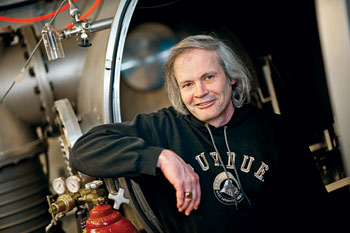Never too late to fulfill a dream
Cofer, the first in his family to go beyond a high school education, planned to pursue aerospace engineering when he enrolled in college in 1980. He wasn't ready to apply himself, though, and dropped out to take a job in a furniture factory in southern Indiana. He lived in a mobile home in the woods near the small town of Paoli and liked the quiet life. But in 2006, as the company began outsourcing jobs and reducing worker hours, he decided to jump ship and take a risk. Rather than hitting the unemployment line, he applied to Purdue and hit the books.

"I had to make a change," he says. "It was a choice to start over again in another factory or go back to school and start something else. I knew what I had to do, so I did it. Anybody can do anything if they try hard enough."
Cofer arrived at Purdue in 2007 and blazed into classes, taking 24 credits one semester (the average full-time student takes 15 credits). He wrapped up his undergraduate degree and continued for a master's degree with a focus on propulsion. He anticipates receiving his doctorate in 2013.
Cofer has come a long way from the homemade experiments of childhood, which took place in the basement and involved using mason jars as beakers and light bulb pieces as flasks. Today, his workplace is Purdue's Aerospace Sciences Laboratory, where he works with Professor Alina Alexeenko on microthruster technology.
Microthrusters control the position and orientation of satellites. Cofer hopes to develop microthrusters that are cheaper and lighter and can be used with the nanosatellites and picosatellites of the future.
As for his journey from laborer in a furniture factory to rocket scientist, he takes it humbly in stride.
"When you're a common laborer you aren't given a lot of self-worth. They tell you they can pull anyone off the street to do your work for you," he says. "Hopefully, now, that won't be the case."
